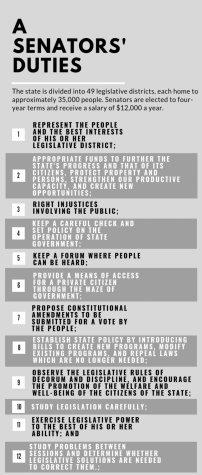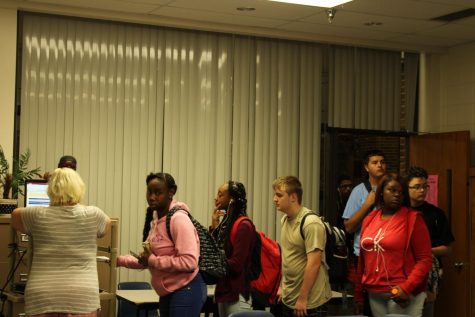OPS suffers from shortage in substitutes
February 28, 2018
A substitute shortage in Omaha Public Schools has had a major effect among schools throughout the district.
Substitute Barbara Hall has been in the education field for 33 years. Hall was a teacher at McMillan Magnet School for 16 years, then taught at Omaha North for 17 years in regular and Advanced Placement Psychology and Geography.
About seven years ago, Hall retired from Omaha Public Schools. Not too soon after, she became a substitute for Northwest, Benson, North, and occasionally at Davis Middle. Hall agreed to substitute and cover for courses within social studies and English classes.
“The substitute shortage in the district was mild when I was teaching here at North, but it really got bad about 5 years ago,” Hall said.
“I think it’s terrible that teachers have to cover for other teachers when they’re gone. Teachers have a hard day as is having three classes a day, and they need their plan period,” Hall continued, “on top of some teachers who have extracurricular activities to work after school.”
Hall believes the reason for the substitute shortage reaching its down point may fall back on the policy, teachers, and the local media reporting situations that happened.
“I think there is a shortage because the economy is strong and there are no benefits. The money isn’t that bad to subbing but you don’t get insurance. People will get another full-time job to get insurance,” Hall said.
“I would give anything to see the people that create the policy to have to teach 3 classes a day and cover someone else’s on a regular basis,” Hall said.
Block scheduling also has an effect on substitutes’ criteria on subbing for teachers. Compared to other schools with regular 40-minute classes to 88-minute classes, students must have work and an appropriate timed lesson planned to keep them busy and behaved.
“Sometimes there are teachers that subs won’t sub for because of their known pattern of not having lesson plans or not too much for the students to do,” Hall said.
Fridays are the prime day of the week, meaning that substitutes have the highest number of requests from teachers. “Fridays are typically the day with the most requests, from over the years. I have learned I don’t mind subbing on a Friday because the students often are too tired to act out from a long week,” Hall said.
From the elementary perspective, Lothrop teacher, Devvonie Johnson, has been in the education field for fourteen years. She was a kindergarten teacher for 11 years, then a second-grade teacher for the past three years.
“The disadvantage is not being able to count on someone being there, students missing instruction, and it shows that people are not interested in working our building,” Johnson said.
Having to get another teacher’s class split into her classroom due to no substitute being available, occurs at least once a month.
“The advantage of not having substitutes is they split the children into classes and whoever gets a few, gets extra pay,” Johnson said. “It’s not much but extra is extra.”
Teacher at Omaha North, Amanda Gutierrez, has been in the education field for nine years, who for the past four years has been a specialized English teacher. The substitute shortage has had an effect on her since she has been a teacher at Omaha North.
“At one point, it impacted me more than other teachers because I had first block plan. Since curriculum specialists knew I had that period for plan, they’d always come ask me first,” Gutierrez said.
The number of requests Gutierrez has to cover another class range from about three to five days a week average.
“It makes it difficult to get everything finished with grading, lesson plans, and things that involve being a teacher. Also with students coming in for extra help or if I schedule meetings, it interferes with that as well,” Guiterrez said.
According to Gutierrez, the positives in substituting for other classes are, “you’re paid for loss of plan time, you get to interact with kids that are not in your class, and see how other classrooms function.”
“Four of the six curriculum specialists are now in the sub rotation because they support their teachers and they know how important plan periods are,” Gutierrez said. “We have a sub rotation that is supposed to make the number of times you cover more equitable. But it works more in theory than in practice.”
North has a sub rotation that is supposed to make the number of times you cover more equitable, so theoretically every teacher has the same number of times they are to cover another class.
“I think every certified staff member should be covering classes because we are a team. What is more important than being in the classroom to teach students?” Gutierrez said.








